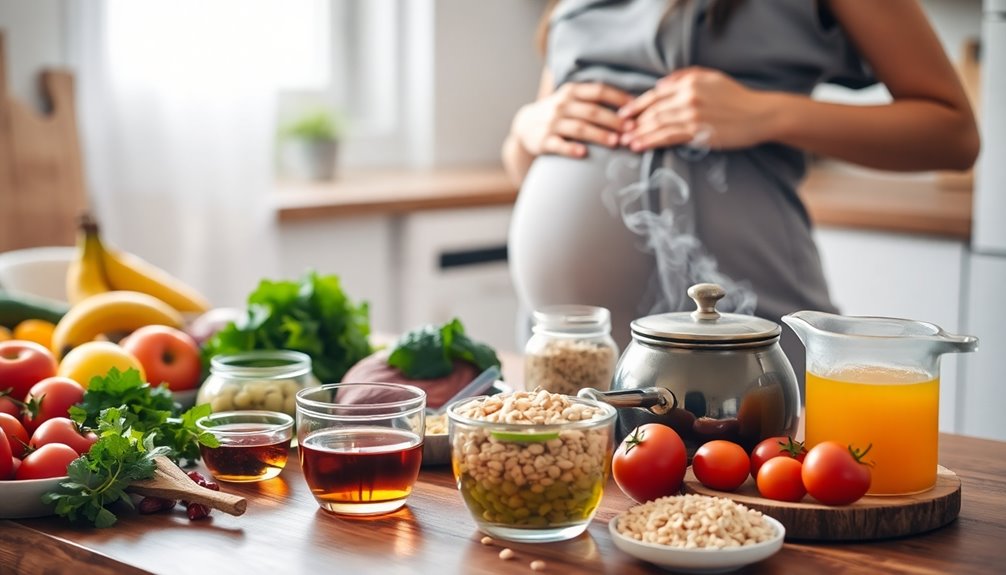Gas pains and bloating during pregnancy can be shocking and uncomfortable. Hormonal changes and the expanding uterus slow down digestion, causing gas buildup. It's essential to watch your diet—avoid trigger foods like beans and carbonated drinks. Eating smaller meals and staying hydrated can help too. If your gas pain becomes severe or disrupts daily life, it may be time to seek medical advice. Discover how to manage these issues and improve your comfort during this special time.
Key Takeaways
- Hormonal changes during pregnancy, especially increased progesterone, can slow digestion and lead to gas buildup and bloating.
- The expanding uterus applies pressure on the abdomen, contributing to discomfort and increased gas production.
- Certain foods, like beans and carbonated drinks, can trigger gas; avoiding them may alleviate symptoms.
- Eating smaller, more frequent meals and staying hydrated can help ease digestive issues and reduce bloating.
- Consult a healthcare provider if gas pain becomes severe or disrupts daily activities, as it may indicate a more serious issue.
What Causes Gas and Bloating in Early Pregnancy?

During early pregnancy, gas and bloating can become common annoyances due to a combination of hormonal changes and physical shifts in your body. Increased progesterone levels relax the muscles of your digestive tract, slowing down digestion and leading to gas buildup.
As your uterus expands, it exerts pressure on the abdominal cavity, intensifying feelings of bloating and discomfort. Hormonal changes, including elevated estrogen, can also cause water retention and boost gas production in your digestive system.
Certain foods, like beans and whole grains, can worsen gas and bloating since they contain complex carbohydrates that are tough to digest. Individual factors, such as lactose intolerance and variations in gut bacteria, can further influence the amount of gas you experience during pregnancy. Additionally, foods that are high in fiber, such as lentils and certain vegetables, may also contribute to increased gas production in the digestive system. Moreover, garlic consumption pregnancy risks should be considered, as excessive intake might lead to gastrointestinal discomfort for some women. It’s important for expectant mothers to monitor their dietary choices and consult with healthcare professionals to manage any adverse effects on their digestive health.
Dietary Considerations for Managing Gas and Bloating

To manage gas and bloating during pregnancy, you'll want to pay attention to your diet.
Avoiding trigger foods like beans and carbonated drinks can make a big difference.
Eating smaller meals more frequently and staying hydrated can help keep your digestion on track.
Trigger Foods to Avoid
Managing gas and bloating during pregnancy often means steering clear of certain trigger foods.
These foods can notably contribute to gas pains and discomfort, so it's vital to be mindful of your diet. Here are three common offenders to avoid:
- Dairy Products: If you're lactose intolerant, dairy can lead to increased gas and bloating.
- High-Fat Foods: Fried or greasy meals can slow digestion, causing gas retention and discomfort.
- Carbonated Beverages: These can increase gas production, leading to bloating.
Keeping a food diary can help you identify specific trigger foods that exacerbate your symptoms.
Meal Frequency Recommendations
Avoiding trigger foods is just one part of managing gas and bloating during pregnancy.
Focus on meal frequency by opting for several small meals throughout the day instead of three large ones. This approach eases your digestive system and helps relieve gas and bloating. Aim to space your meals every 2-3 hours to minimize pressure on the abdominal area.
Fill these meals with nutrient-dense foods that are easy to digest. Additionally, remember to chew your food thoroughly and eat slowly to decrease the amount of air swallowed, which can contribute to pregnancy gas.
Keeping a food journal can also help you identify personal triggers and optimize your meal frequency and composition for better comfort.
Hydration and Digestion Tips
Staying properly hydrated plays an essential role in digestion and can help mitigate gas and bloating during pregnancy. Here are some tips to enhance your hydration and digestion:
- Drink 8 to 10 glasses of water daily to alleviate constipation and reduce gas pain.
- Eat small meals throughout the day to aid digestion and minimize gas buildup from larger meals.
- Keep a food diary to identify foods that trigger bloating and adjust your diet accordingly.
Additionally, avoid carbonated beverages and high-sugar foods, which can contribute to gas formation.
With increased progesterone during pregnancy, these strategies can greatly improve your comfort and digestive health. Incorporating low carb foods into your diet can also help reduce bloating and enhance overall digestion.
Prioritizing hydration and mindful eating can make a noticeable difference.
Lifestyle Changes to Alleviate Gas Pain

To ease gas pain during pregnancy, you can make some simple lifestyle changes.
Staying hydrated and adjusting your diet can greatly improve your digestion.
Additionally, practicing mindful eating can help you enjoy your meals while reducing discomfort.
Hydration and Diet Adjustments
While you navigate the challenges of pregnancy, making thoughtful hydration and diet adjustments can greatly ease gas pains and bloating.
Here are three effective strategies:
- Stay Hydrated: Aim for 8 to 10 glasses of water daily to improve digestion and alleviate gas pain.
- Opt for Smaller Meals: Eating three meals and two to three snacks throughout the day can minimize discomfort and promote better digestion.
- Track Your Intake: Keep a food diary to identify gas-triggering foods and gradually increase your fiber intake through fruits, vegetables, and whole grains to prevent constipation, which is often linked to bloating.
Mindful Eating Practices
Mindful eating practices can make a significant difference in managing gas pain and bloating during pregnancy. To ease abdominal pain during pregnancy, try eating smaller meals throughout the day instead of large ones. This approach helps your digestion, which slows down as your pregnancy progresses.
Make sure to stay hydrated by drinking water throughout the day, as it can help reduce constipation and discomfort from gas. Keeping a food diary can also be beneficial; track your intake of known gas-inducing foods like beans and cruciferous vegetables to identify triggers.
Finally, engage in light physical activity, such as walking after meals, to stimulate digestion and alleviate gas pain and bloating.
Identifying Trigger Foods to Avoid

Identifying trigger foods is essential for managing gas and bloating during pregnancy. Keeping a food diary can help you pinpoint specific foods that cause discomfort, allowing for tailored dietary choices.
Here are three common gas-producing foods to watch out for:
- Beans and legumes – Known for their high fiber content, they cause significant fermentation.
- Dairy products – If you have lactose intolerance, these can lead to increased gas and bloating.
- Certain fruits and sugar-free products – Foods containing sorbitol can worsen gas symptoms. Additionally, raw food diets may help some individuals reduce bloating by focusing on whole, unprocessed foods.
When to Seek Medical Advice for Gas Pain

When should you consider seeking medical advice for gas pain during pregnancy? If you experience severe abdominal pain, fever, or bleeding, it's essential to seek immediate medical attention. Additionally, monitor changes in gas pain quality; if it intensifies or radiates, consult your healthcare provider. Persistent gas pain that disrupts your daily activities or comfort calls for professional guidance. If you also have symptoms like persistent vomiting, diarrhea, or dehydration, don't hesitate to seek medical advice. Those with a history of gastrointestinal disorders should discuss any significant changes in gas patterns with their healthcare provider.
| Symptoms | Action Needed | When to Seek Medical Advice |
|---|---|---|
| Severe abdominal pain | Immediate medical attention | Always |
| Persistent gas pain | Consult healthcare provider | If it disrupts daily activities |
| Vomiting/Diarrhea | Seek medical advice | If persistent |
| Change in gas patterns | Discuss with provider | If significant |
Strategies for Long-Term Relief From Gas and Bloating

To effectively manage gas and bloating during pregnancy, you can adopt several practical strategies that promote digestive health. Here are three effective methods to help you:
- Eat several small meals throughout the day instead of three large ones. This helps ease digestion and reduce gas buildup.
- Keep a food diary to identify common causes of gas during pregnancy. Limiting gas-inducing foods, like beans and carbonated drinks, can greatly decrease discomfort.
- Stay hydrated by drinking 8 to 10 glasses of water daily. This aids digestion and alleviates constipation, which can worsen gas and bloating.
Incorporating light physical activities and practicing mindful eating can also help relieve gas pain and improve your overall digestive health.
Frequently Asked Questions
Can Gas Cause Sharp Pain in Early Pregnancy?
Yes, gas can definitely cause sharp pain in early pregnancy. As your body undergoes hormonal changes, progesterone levels rise, relaxing your intestinal muscles and slowing digestion.
This can lead to gas buildup, creating discomfort that feels sharp or stabbing in your abdomen. You might also experience bloating and cramping.
While it can be intense, it's usually harmless and can be managed through dietary changes and lifestyle adjustments.
Don't hesitate to consult your doctor if it concerns you.
What Are 5 Warning Signs of a Possible Problem During Pregnancy?
Are you aware of the warning signs that could indicate a problem during pregnancy?
Pay attention to severe abdominal pain, especially if it's sharp and persistent.
Sudden heavy vaginal bleeding with cramping can also be alarming.
Look out for severe headaches, vision changes, or swelling in your hands and face, as these might signal preeclampsia.
Finally, a significant decrease in fetal movement after 28 weeks should prompt immediate evaluation by your healthcare provider.
Does Pregnancy Implantation Cause Gas?
Yes, pregnancy implantation can cause gas.
As the fertilized egg attaches to the uterine lining, hormonal changes kick in, particularly an increase in progesterone. This hormone relaxes your intestinal muscles, slowing digestion and leading to gas and bloating.
You might notice these symptoms as your body adjusts during early pregnancy. While they can be uncomfortable, they're usually temporary and often persist due to ongoing hormonal fluctuations.
How Early Does Bloating Start in Early Pregnancy?
You might feel like a balloon that's slowly inflating.
Bloating can kick in as early as the first few weeks of your pregnancy, often right around when you miss your period. This happens due to hormonal changes, particularly increased progesterone, which relaxes your intestinal muscles, slowing digestion.
As your uterus expands, you may also experience a sense of fullness. Many women notice this bloated feeling even before a positive pregnancy test confirms their news.
Conclusion
In the journey of pregnancy, gas pains and bloating can feel like unwelcome guests at a celebration. But by understanding their causes and making mindful dietary and lifestyle changes, you can reclaim your comfort. Remember, you're not alone in this; many experience the same discomfort. So, keep track of your triggers and consult your doctor when needed. With the right strategies in place, you can enjoy this beautiful chapter with less discomfort and more joy.









